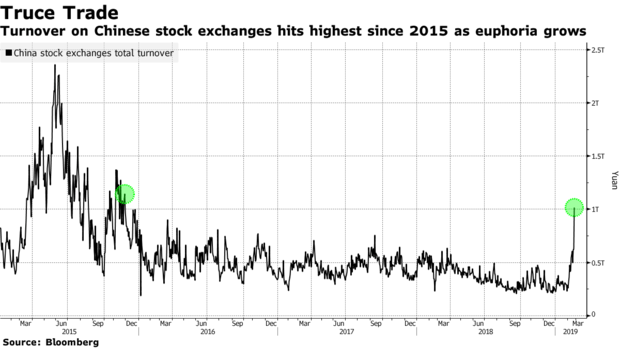US-China Trade Optimism Fuels $1 Trillion Chinese Stock Rally

U.S.-China trade negotiations sour at the worst possible time. | Source: AP Photo / Andy Wong, File
Following a period of economic turmoil caused by trade friction between the U.S. and China, Chinese markets are experiencing an extraordinary recovery driven by indications that Donald Trump may be softening his hard line in trade negotiations between the world’s two largest economies. After Trump announced that he would postpone the March 1 deadline for Chinese import tariff hikes, the CSI 300 Index recorded a 6 percent surge last Monday. The Shanghai Composite Index also recorded its best day since June 2015, after it closed with a 5.6 percent gain.
It will be recalled that over the past few weeks, both Trump and Xi have made a series of overtures toward each other with the aim of staving off the potential escalation of the ongoing tariff war, which would be devastating to both economies. On February 15, CCN.com reported that the Dow surged 450 points on news that Trump’s administration planned to push back the March 1 deadline by 60 days to May 1, giving both countries an extra two months to hammer out a deal instead of embarking on a costly economic war amidst slowing global economic conditions.
Chinese Stock Euphoria
According to Trump, if trade talks continue to progress between both countries, he and Chinese President Xi Jinping will hold a summit with the goal of ending the trade war which has lasted about a year. President Jinping also made similar noises after the meeting over the weekend, expressing hopes that Beijing’s economy would be rejuvenated through financial reforms and having a better capital market.
Following Trump’s address, shares of Citic Securities, China’s biggest brokerage firm rose by 8.3 percent. Experts have said the president’s speech is indicative that the Chinese government will be focused on financial reforms in the coming years and they expect policymakers to start pushing for reforms that support financial growth in the coming years.
Quoted in the Wall Street Journal, senior analyst at Central China Securities Zhang Gang said :
I think it’s a 70:30 split between President Xi’s remarks and the progress on trade talks when it comes to the impact on the market. It’s clear that the government wants a rising stock market to reduce financial risk such as debt.
Chinese stock turnover has raced into a 3 year-high following the trade war truce | Source: Bloomberg
Should Investors Get Excited? Probably Not
Analysts, however, have been quick pour cold water on the idea that a significant bull breakout is underway, given that the deadline postponement was already widely predicted by several experts. Shanghai-based strategist Shen Zhengyang has warned that investors should not get too excited because the basic underlying fundamentals are “still bad,” and the market is still markedly volatile.
Reiterating this point in a quote cited by MarketWatch , J.P. Morgan Asset Management analyst Tai Hui said:
The latest news may not offer a significant boost to start the week. Nonetheless, it helps to underpin positive investor sentiment.
While Trump in his typical style may be eager to claim any eventual positive impact of the deadline postponement on U.S. markets as his achievement, it is important to note that the entire problem is his creation as well. From the outset, several experts have warned that taking on the world’s largest industrial economy in a 20th century-style tariff war would not only be ineffective towards reducing the trade deficit, but it would actually harm the U.S. economy in the long run.
Like in a number of other areas, the Trump administration chose to prioritize drama over economic reality, dragging the U.S. into a costly, divisive and mutually damaging economic war of attrition with a rival that the administration insists on viewing as a junior partner that can be called to heel despite all evidence to the contrary.

Trump’s Probable Trade War Endgame
In all probability, the two possible outcomes are that a) at the expiration of the new deadline, no deal is reached and the trade war escalates further; or b) a deal that is not too different to what Trump met in 2016 is reached, putting an end to an unnecessary period of economic disruption, with Trump loudly declaring the resultant market bounce as an achievement.
Investors should probably remain wary of stocks moving off the back of news coming out of the trade negotiations, because the upward movement is likely to be short-lived in the event of a no-deal scenario, or unsustained in the event of a Trump-style disaster deal that changes nothing after disrupting everything. The most recent example of such a Trump deal is that which brought an end to the 35-day government shutdown earlier this month without obtaining any funding for the proposed border wall which had been cast as the central issue.
Clearly, Trump believes that trade negotiations with a global superpower can be handled using the same shock-and-bluster tactics he uses to govern at home. The Chinese obviously have other ideas, so while upward stock movement is definitely welcome, it would probably be wise to hold off on jumping onto Chinese stocks just yet until greater clarity has been established as trade talks continue.
